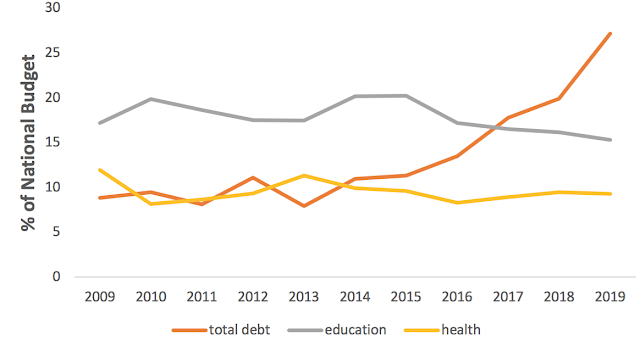Specifically, Bill 10 proposes to delete clause (2) of Article 213 of the current Constitution and replace it with a new clause. Article 213 (2) of the current constitution spells out BoZ's functions as follows:
"(2) The functions of the Bank of Zambia are to— (a) issue the currency of the Republic; (b) determine monetary policy; and (c) regulate banking and financial services, banks, financial and non-banking institutions, as prescribed."
Bill 10 proposes that Article 213 (2) be replaced with:
"(2) The function of the Bank of Zambia is to formulate and implement monetary policy."
The concluding section of my July blog post read as follows:
"So it seems that the Draft Amendment Bill seeks to strip away from the Central Bank the functions of issuing currency and the regulation of the financial sector. These two functions are pretty core to what central banks do across the world. And I can't see how another entity would logically takeover these functions, particularly the one to do with issuing currency. And the Draft Amendment Bill is silent on where functions (a) and (c) will now sit.
This is a strange amendment and one hopes that Members of Parliament will probe for details and justifications once the Bill is tabled in the National Assembly."
Yesterday, BoZ issued a belated press statement seeking to explain the reasons for the proposed amendment. Below is an excerpt of the most important parts of their press statement:
"The proposed provisions relating to the Central Bank were motivated by the Bank which is of the view that the Constitution should only contain broad constitutional principles which are operationalised through detailed legislation passed by Parliament. In this regard, the Bank submitted proposals for amendment of the Constitution regarding the Central Bank's functions to be restricted to the primary function, while additional functions, objectives and powers will continue to be subject of an Act of Parliament as envisaged under Article 215 of the Constitution of Zambia, Act No. 2 of 2016.
The Bank has thus submitted to the Government that the primary function of the Bank should be to formulate and implement Monetary Policy. This submission is consistent with best practice on central banking and also complies with the SADC Model Law for Central Banks which stipulates that all Central Banks in the region should move towards adopting a single primary objective."
BoZ's press statement revealed that they are the originators of the proposed amendment. Further, the proposed amendment, according to BoZ, has two objectives: 1. Maintain broad principles in the Constitution but have specifics spelled out in subsidiary legislation and 2. Bring the Bank's "primary function" in line with "best practice" and in line with SADC Model Law for Central Banks.
I find the Central Bank's motivations to be highly problematic and also confusing. First, the issuance of currency is no ordinary function such that its specifics can be left out of the Constitution. Relegating specifics about currency issuance to subsidiary legislation leaves them wide open to manipulation. The requirements to amend subsidiary legislation are much less demanding than those required to alter sections of the Constitution. Suppose the specifics about currency issuance were only spelled out in subsidiary legislation such as the BoZ Act, nothing would stop a government with sinister aspirations from proposing an easily achievable amendment to remove this function from BoZ and give it to some other less competent entity. And these kind of things are very much possible given the current political context in the country.
Second, BoZ argues in their press statement that they are proposing the amendments to meet "best practice" and SADC objectives. This is the bit that is confusing. The Constitution is a document meant for the people of Zambia and should only contain the aspirations of the people of Zambia and no one else. Any "best practice" or regional norms should be reflected in our Constitution to the extent that they are in line with our aspirations and our own unique set of circumstances. The latter point is important because the current political climate teaches us every day that we need to make our Constitution ever more specific in its contents rather than make it vague with dilutions. This may not be the case with other countries in SADC who might have better political contexts where such vagueness may not pose existential threats. In any case, the same objective of satisfying "best practice" and SADC norms can still be met by spelling those out in subsidiary legislation and leaving the current Constitutional provisions intact.
In a nutshell, I don't find BoZ's justifications convincing and I am still of the opinion that this proposed amendment should be withdrawn and Article 213(2) should remain as is. Many countries have come asunder due to the careless handling of the printing press.


